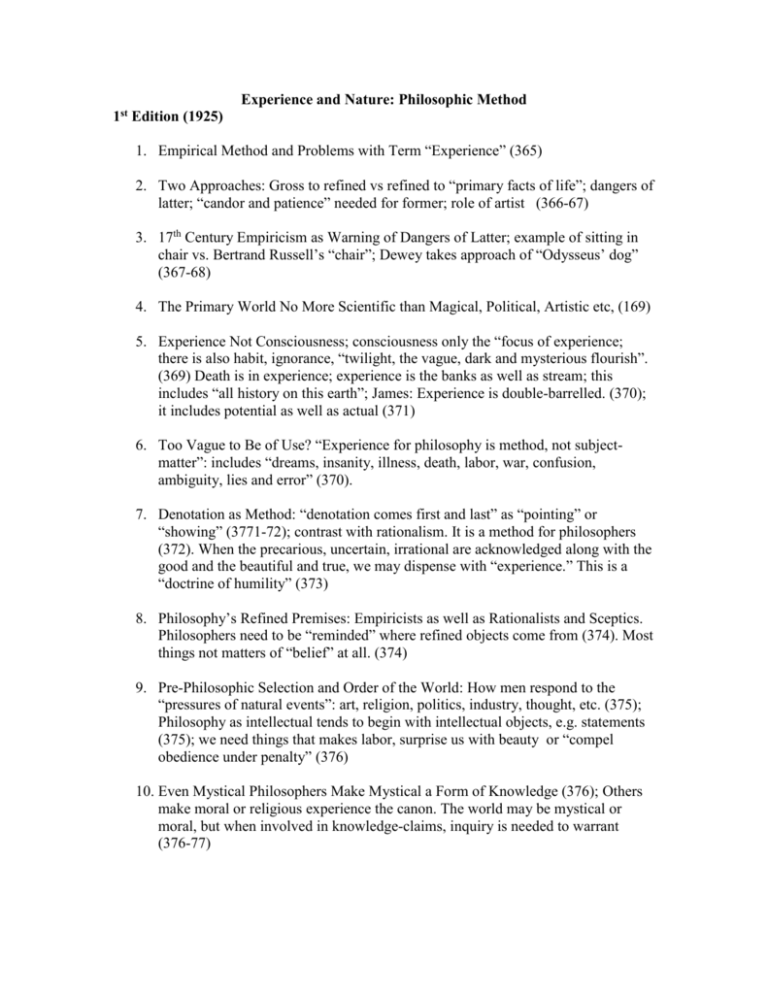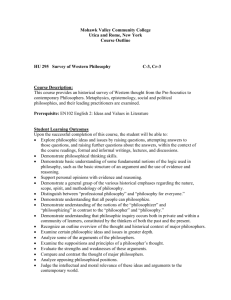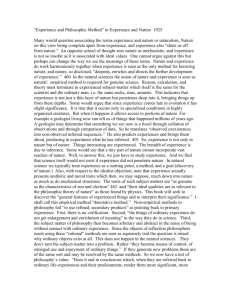Experience and Nature - Society for the Advancement of American
advertisement

Experience and Nature: Philosophic Method 1st Edition (1925) 1. Empirical Method and Problems with Term “Experience” (365) 2. Two Approaches: Gross to refined vs refined to “primary facts of life”; dangers of latter; “candor and patience” needed for former; role of artist (366-67) 3. 17th Century Empiricism as Warning of Dangers of Latter; example of sitting in chair vs. Bertrand Russell’s “chair”; Dewey takes approach of “Odysseus’ dog” (367-68) 4. The Primary World No More Scientific than Magical, Political, Artistic etc, (169) 5. Experience Not Consciousness; consciousness only the “focus of experience; there is also habit, ignorance, “twilight, the vague, dark and mysterious flourish”. (369) Death is in experience; experience is the banks as well as stream; this includes “all history on this earth”; James: Experience is double-barrelled. (370); it includes potential as well as actual (371) 6. Too Vague to Be of Use? “Experience for philosophy is method, not subjectmatter”: includes “dreams, insanity, illness, death, labor, war, confusion, ambiguity, lies and error” (370). 7. Denotation as Method: “denotation comes first and last” as “pointing” or “showing” (3771-72); contrast with rationalism. It is a method for philosophers (372). When the precarious, uncertain, irrational are acknowledged along with the good and the beautiful and true, we may dispense with “experience.” This is a “doctrine of humility” (373) 8. Philosophy’s Refined Premises: Empiricists as well as Rationalists and Sceptics. Philosophers need to be “reminded” where refined objects come from (374). Most things not matters of “belief” at all. (374) 9. Pre-Philosophic Selection and Order of the World: How men respond to the “pressures of natural events”: art, religion, politics, industry, thought, etc. (375); Philosophy as intellectual tends to begin with intellectual objects, e.g. statements (375); we need things that makes labor, surprise us with beauty or “compel obedience under penalty” (376) 10. Even Mystical Philosophers Make Mystical a Form of Knowledge (376); Others make moral or religious experience the canon. The world may be mystical or moral, but when involved in knowledge-claims, inquiry is needed to warrant (376-77) 11. Being and Having vs. Knowing (377-78); “all cognitive experience must start from and terminate in being and having things…” (377). Modern and Ancient philosophy equate reality with the known (377); this renders impossible the distinction between knowing vs. being and having. (377). 12. The “Problem of Knowledge” Not a Problem: This removes the need to solve the relation of sensory knowledge and intellectual (377-78). Knowledge is something we have (378); the “given” is a selection made in a larger contest of inquiry (379) 13. The Denotative Method is Realistic: “Real” means “things done and suffered” (380); this is prior to any “subjective-objective” distinction which is practically drawn; theoretically a continuum is prior (380-81). The things men fight for are not “subjective”; the aesthetic is in the world (381-82). 14. Experience as Experiencing is Modern Noton: Important in discerning the role of the body in experience, but must be taken as active performances and not “states” of mind . (382) We experience meanings (383) 15. Memory: Culture is the primary memory (383); the potential is experienced when we act in the world; intellectualists minimize it (383) Modern philosohy made experience the known instead of essences (384) 16. The Method’s Use: Denotes the field, the sun, the clouds. Rains, seeds, harvest and farmer.” (384) Man in nature is man subjected; nature in man is intelligence and art (384); the philosopher needs to be reminded of the prior integration (384) 17. Denotation as Historical and Temporal: “Experience is history…” (385); no timeless objects. 18. Experience Not a Stuff but a Method (385-86); it si a cautionary method (386); we are “on guard” not to treat distinctions, like mental and physical, as primary; we are “reminded” that pre-philosophical experience groups objects into other categories than “known”—indeed knowledge itself is had before it is known (386); it “cautions” us to begin with complex entanglements rather than simplifications (387). Temporal quality is not a reversal of process or stability (387); 19. Philosophy and “The Moral Fallacy”: most philosophical simplifications are due to moral interests so “all philosophy is a branch of morals” (387); philosophers as thinkers of leisured class—the eventual reconstituted as eternal and prior (388). The empirical method reveals the role of choice (389); “protects” us from making the consequent antecedent.. 20. Empirical Method as Map: Show how things are arrived at (389). The idea is not to eliminate choice but to acknowledge it and make it more intelligent (390) 21. All philosophies employ empirical subject-matter (391) We need “respect” for experience” (392) 2nd Edition (1927) 1. Terms for Philosophy: Empirical naturalism, naturalistic empiricism, naturalistic humanism (10) 2. Experience and Nature as Opposed—here ex[perience is not a veil but a method for penetrating nature as in science (10-11) Experience reaches down into nature and piles the goods high like a miner (11) 3. Experience as Late-comer in Evolution; Science shows it does enter into possession of nature; example of geologist (11-12) 4. Experience is Of as well as In Nature: things are hows of experience; experience also has stretch, inference (12-13); just because it is late in evolution doesn’t mean it isn’t capable—as science shows (13) In science we begin with experience (13) 5. Experience Not Materialistic: “Ideal” aspects also in experience (13-14) 6. Aim of Book: To discover general features of experience for a philosophic theory of the universe; empirical method for philosophy liberates as does science (14) 7. Science does have to talk about experience because it is used (14); Roger and Francis Bacon had to argue for it. (14) 8. Gross vs Refined Experience; example of science: it explains the primary objects. Example of eclipse in testing Einstein on light (15-16) 9. Denotative Method: Pointing, showing (16-17); lack of it implies no verification, no enlargement of meaning, philosophy becomes abstract ; philosophic objects as supremely real vs. denotative method opening further inquiry.(17) The test of philosophy: does it illuminate the world? (18) 10. Empirical vs. Non-empirical Philosophies: James on “double barreled” aspect of “experience.” (18)—the planted field, the harvest, the farmer, etc. (18). “Life” and “history” similar (18-19); empirical method the only one that does justice to this (19) 11. Naturalistic Empiricism Avoids Dualism: Naturalistic empiricism leads to tools and technologies (20); the history of science as liberation (20); problems with 17th century concept of experience. 12. Subject and Object: Mental and physical objects are discriminated out of ordinary experience (21). Our natural bias is to the objective (22); subjectivism as advance and coexistent with rise of individualism (23). Example of chair (24-25) 13. Philosophical Objects: Philosophy tends to treat them as primarily real (26); but desire and reverie are real too (27) What is in experience extends further than what is known (27); it is important to note the dark and twilight (27-28) 14. Intellectualism: The vice of philosophy is intellectualism (28-29); knowledge is a way of control (29); intellectualism results in the subjective nature of the mental (30) 15. Selective Emphasis as Cause: This is due to selective emphasis (31); value of certainty (31), elements , the eternal (32); choice is useful in action (34). Do not commit The Philosophic Fallacy (34) 16. No Guarantees: method points out where and when , like science (34); the value of experiments (35) 17. Three Fallacies (36) 18. Primary Experience of Little Value (37): Philosophy tends to borrow from intellectual objects of the science of the day (37); but this is not how science operates (38) 19. What Empirical Method Requires: Trace things back to primary experience, and bring secondary objects back to primary experience (39) 20. Empirical Philosophy: It will study life-experience (40); it is intellectual disrobing (40)







